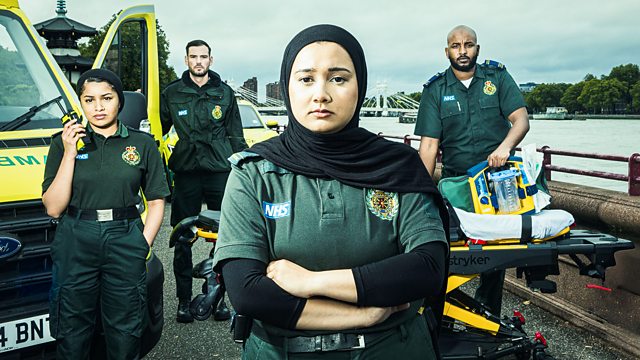
One of London's specialist mental health cars helps to ease pressure on the service from the growing number of patients in crisis, including a homeless university student living rough.
BAFTA award-winning series Ambulance returns to London – the UK’s biggest and busiest ambulance service – to reveal how frontline staff are struggling to deliver care to the nine million people of the capital. We witness them go above and beyond during the most testing of times, despite unrelenting winter pressures on the service and a national cost-of-living crisis.
Two hours into the day shift, and the London Ambulance Service has already received more than 400 calls when a new 999 emergency is received for a patient threatening to jump off a bridge in central London. Crewmates Kinsey and Lottie are the nearest available ambulance and are immediately dispatched alongside police and fire.
In south London, paramedic Hannah and mental health nurse Niall are working in one of London’s specialist mental health cars. They help to care for patients in mental health crisis, ensuring wherever possible that they receive the treatment they need at home to avoid an unnecessary trip to hospital. As they sign on to their shift, they are dispatched to a library where an intoxicated man is feeling suicidal. On arrival, the patient opens up about his struggles, confiding to them his darkest thoughts. The crew are deeply affected by his story. Hannah reflects that working in the mental health car, you see great sadness. The idea of being able to have a skill set, to be able to support someone in that moment is just so powerful. The impact that communication and human connection can have is huge.
Meanwhile, ambulance crewmates Naimah and Manny are attending their first patient of the day. He is a 57-year-old male patient, vomiting and struggling with alcohol withdrawal. The crew are shocked to see the dreadful conditions the patient is living in, in his temporary accommodation. As Naimah offers her patient reassurance, he tells her that he once earned a six-figure salary, but after losing his job, he found himself living on the streets. His story feels uncomfortably close to home for Naimah, who became homeless herself when she was six. She reveals that it was a massive struggle that saw her family end up in a hostel. Naimah reflects on what her mother had to go through, and that if she’d been alone, she probably wouldn’t have coped. A lot of the patients Naimah sees have no-one. So, how do they cope?
In the mental health car, Hannah and Niall are on scene with another suicidal patient living rough in a supermarket car park. After initially welcoming their help, the patient refuses treatment and becomes aggressive towards the crew.
It is not just the crews on the ground who are dealing with mental health. Call handler Louis spends over an hour patiently offering support to a patient in the middle of a mental health crisis. Once it is over, it becomes clear that the call has taken its toll on him.
Amidst the mental health emergencies, other human dramas play out. Advanced paramedic Mike is dispatched to an 80-year-old male in cardiac arrest. On scene, Mike learns that the patient’s wife is also critically ill and had been rushed into hospital that same morning, leaving their son who has arrived on scene to take the difficult decision of whether to withdraw care for his dad.
As the busy day shift draws to a close, crewmates Hannah and Niall are dispatched to yet another suicidal patient living in a car park. The patient tells the crew that he came to London to study as a university student but is now seeking asylum. As a result, he has no means of support and no-one to help him in his struggle to keep studying while homeless. The crew are heartbroken to learn of his story and are quick to make a safeguarding referral in the hope social services might be able to help him. The patient is overwhelmed with gratitude towards the crew, as he tells them they are the first to take the time to listen to him and offer their support. At the end of a challenging shift, Hannah reflects on the fact that she has had her own struggles. For her, the most important thing is just listening. When she was unwell, she was lucky to get the support and had people who listened. If someone hadn’t advocated for her in that moment, she genuinely thinks she would never have become a paramedic.
By embedding with one of London’s dedicated six mental health cars, this episode highlights the demand on mental healthcare services across the capital. We see how London Ambulance Service has had to evolve to support the estimated two million people suffering with poor mental health in the city and witness how the paramedics frequently draw on their own personal experiences to help distressed patients on their journey to recovery.
On TV
More episodes
Previous
You are at the first episode
Next
Clip
-
![]()
Ambulance Trailer (short)
Duration: 00:20
Credits
| Role | Contributor |
|---|---|
| Narrator | Christopher Eccleston |
| Executive Producer | Simon Ford |
| Executive Producer | Lucy Morgan |
| Series Producer | Tasha McLintock |
| Series Editor | James Robinson |
| Director | Aodh Breathnach |
| Production Company | Dragonfly Film and Television |
Broadcasts
- Thu 24 Apr 2025 21:00
- Wed 30 Apr 2025 00:40���˿��� One London HD & London only

